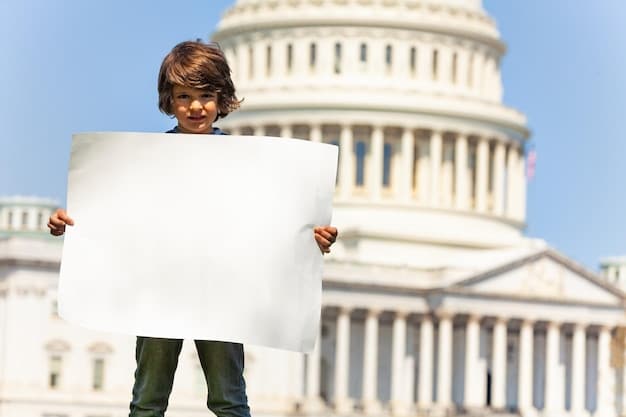Understanding Federal Hate Crime Legislation Updates & Racial Justice in 2025

Understanding the latest updates to federal hate crime legislation in 2025 is crucial for assessing their impact on racial justice, including enhanced protections for marginalized groups and stricter penalties for offenders.
Navigating the complexities of federal hate crime legislation is essential for understanding its implications for racial justice in the US in 2025. This article delves into the understanding the latest updates to federal hate crime legislation and their impact on racial justice in 2025, exploring potential advancements and challenges.
The Evolution of Federal Hate Crime Laws
Federal hate crime laws have evolved significantly over time, reflecting a growing awareness of the impact of bias-motivated violence. Understanding this evolution provides a context for analyzing recent updates and their potential effects.
Initial federal involvement in hate crime legislation was limited, primarily focusing on civil rights violations. However, landmark cases and advocacy efforts led to the expansion of federal jurisdiction and the creation of specific statutes targeting hate crimes.
Key Legislation in the History of Hate Crime Laws
Several key pieces of legislation have shaped the landscape of federal hate crime laws. These laws have expanded protections and increased penalties for offenders, reflecting a commitment to addressing bias-motivated violence.
- The Civil Rights Act of 1964: While not specifically a hate crime law, it laid the groundwork for federal intervention in cases involving discrimination and civil rights violations.
- The Hate Crime Statistics Act of 1990: Mandated the collection of data on hate crimes, providing valuable insights into the prevalence and nature of bias-motivated offenses.
- The Violent Crime Control and Law Enforcement Act of 1994: Increased penalties for hate crimes and expanded the categories of protected characteristics.
Understanding the historical context of federal hate crime laws is crucial for assessing the significance of recent updates and their potential impact on racial justice. By examining the evolution of these laws, we can gain a deeper appreciation for the ongoing efforts to combat bias-motivated violence.

Analyzing the Latest Legislative Updates
Recent updates to federal hate crime legislation reflect a continuing effort to strengthen protections for marginalized groups and address emerging forms of bias-motivated violence. Analyzing these updates is essential for understanding their potential impact on racial justice.
These amendments and revisions aim to address loopholes, expand the scope of protected characteristics, and enhance penalties for offenders. They also reflect a growing awareness of the intersectional nature of hate crimes, recognizing that individuals may be targeted based on multiple factors.
Specific Changes in the Updated Legislation
The latest updates to federal hate crime legislation include several specific changes that could have significant implications for racial justice. These changes may include adjustments to the definition of hate crimes, expansions of protected characteristics, and enhancements to penalties.
- Expanded Definition of Hate Crimes: Clarifying the definition of hate crimes to include offenses motivated by gender identity, sexual orientation, and disability.
- Enhanced Penalties: Increasing the severity of penalties for hate crimes, including longer prison sentences and higher fines.
- Increased Federal Oversight: Strengthening federal oversight and coordination in the investigation and prosecution of hate crimes.
By understanding the specific changes in the updated legislation, we can better assess their potential impact on addressing hate crimes and promoting racial justice in the United States. This analysis is essential for ensuring that the laws effectively protect marginalized groups and hold offenders accountable.
The Impact on Racial Justice Initiatives
The latest updates to federal hate crime legislation have the potential to significantly impact racial justice initiatives across the country. The effectiveness of these laws in addressing racial bias and violence will depend on various factors, including enforcement, community engagement, and public awareness.
The changes may help to provide additional legal tools for prosecuting hate crimes motivated by racial bias, but they also raise questions about implementation and potential unintended consequences. Understanding the potential impact of these updates on racial justice initiatives is crucial for ensuring that they contribute to a more equitable and just society.
Strengthening Community Relations
Effective implementation of updated hate crime legislation requires strong community relations and partnerships. Building trust between law enforcement and marginalized communities is essential for encouraging reporting and ensuring that victims feel safe coming forward.
Community-based organizations, advocacy groups, and civil rights leaders can play a vital role in educating the public about hate crime laws and promoting understanding and tolerance. Collaborative efforts can help to foster a more inclusive and welcoming environment for all members of society.
The importance of community relations in combating hate crimes cannot be overstated. By strengthening relationships between law enforcement, communities, and advocacy groups, we can create a more effective and responsive system for addressing bias-motivated violence and promoting racial justice.

Challenges in Enforcement and Prosecution
Despite the potential benefits of updated hate crime legislation, challenges remain in enforcement and prosecution. Addressing these challenges is crucial for ensuring that the laws are effectively utilized to combat bias-motivated violence and promote racial justice.
One significant challenge is proving the element of bias motivation in hate crime cases. This requires careful investigation and the collection of evidence demonstrating that the offender was motivated by prejudice or animus towards the victim’s race or other protected characteristic.
Addressing Bias in the Criminal Justice System
Bias within the criminal justice system can also pose a challenge to the fair and effective enforcement of hate crime laws. Implicit biases among law enforcement officers, prosecutors, and judges can influence their perceptions and treatment of hate crime incidents.
Combating bias in the criminal justice system requires ongoing training and education, as well as accountability measures to address instances of discrimination or misconduct. By working to eliminate bias and promote fairness, we can ensure that hate crime laws are applied equitably and justly.
The Role of Education and Awareness Programs
Education and awareness programs play a crucial role in preventing hate crimes and promoting understanding and tolerance. These programs can help to challenge stereotypes, promote empathy, and encourage individuals to stand up against prejudice and discrimination.
Effective education initiatives often involve partnerships between schools, community organizations, and advocacy groups. These partnerships can help to reach a wide audience and promote a consistent message of respect and inclusion. Additionally, media campaigns and social media initiatives can also raise awareness and promote positive attitudes.
Promoting Tolerance in Schools
Schools are an ideal setting for implementing programs that promote tolerance and understanding. By integrating lessons on diversity, inclusion, and respect into the curriculum, schools can help to create a more welcoming and supportive environment for all students.
- Diversity Training: Implementing diversity training programs for teachers and staff, as well as students.
- Curriculum Integration: Integrating lessons on diversity and inclusion into the curriculum.
- Peer Mediation: Encouraging peer mediation programs to address conflicts and promote understanding.
Future Directions and Policy Recommendations
Looking ahead, there are several areas where further progress can be made in strengthening federal hate crime laws and promoting racial justice. Policy recommendations should focus on enhancing enforcement, expanding protections, and promoting prevention through education and awareness initiatives.
By taking these steps, we can ensure that federal hate crime laws play a crucial role in combating bias-motivated violence and promoting a more just and equitable society for all.
Strengthening Data Collection and Reporting
Accurate data collection and reporting are essential for understanding the prevalence and nature of hate crimes. Strengthening data collection efforts can help to identify trends, assess the effectiveness of current laws, and inform policy recommendations.
- Mandatory Reporting: Enacting mandatory reporting requirements for hate crimes at the state and local levels.
- Standardized Data Collection: Implementing standardized data collection methods to ensure consistency and accuracy.
- Public Access: Providing public access to data on hate crimes to increase awareness and transparency.
| Key Point | Brief Description |
|---|---|
| ⚖️ Evolution of Laws | Historical overview and legislative milestones. |
| 📈 Impact Analysis | Effects on racial justice initiatives and communities. |
| 📚 Education & Awareness | The role of education in preventing hate crimes. |
| 🎯 Policy Changes | Future directions and recommendations for better policies. |
Frequently Asked Questions (FAQ)
▼
A federal hate crime is a criminal offense motivated by bias against a victim based on their race, religion, sexual orientation, or other protected characteristic, violating federal law.
▼
Updated laws enhance protection for minority communities by increasing penalties for bias-motivated crimes and expanding the scope of offenses that qualify as hate crimes.
▼
Challenges include proving bias motivation, overcoming victim reluctance to report, and addressing implicit biases within the criminal justice system itself.
▼
Communities can implement education programs, promote diversity and inclusion, support victims, and report incidents to law enforcement promptly to prevent hate crimes.
▼
Resources include victim assistance programs, legal aid, counseling services, and community support groups that provide emotional and practical support to hate crime victims.
Understanding the latest updates to federal hate crime legislation and assessing their impact on racial justice are critical steps in the ongoing pursuit of equality and justice in the United States. By addressing challenges, promoting education, and strengthening community relations, we can work towards a more inclusive and equitable society for all.





